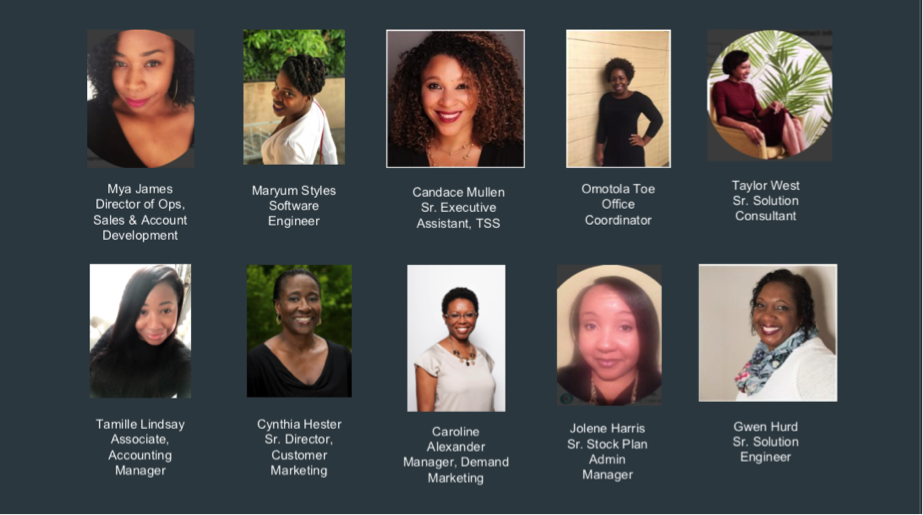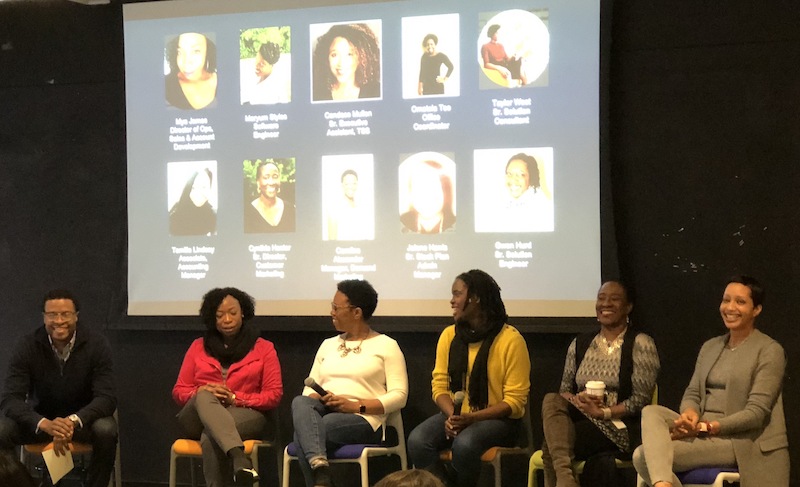In honor of Black History Month, New Relic’s “Relics of Color” (ROC) Employee Resource Group prepared an incredible month of programming to celebrate and remember important events and people in American history. We heard from a number of internal and external speakers (including Emory Douglas, the former Minister of Culture of the Black Panther Party), hosted employee panel discussions, mingled at a Wakanda-themed happy hour, and even got together to enjoy a film screening of BlaKkKlansman. It’s been a month focused on community, history, and insight and I’m proud to have been a part of it.
But perhaps the most special moment for me occurred early in the month, when I participated in a panel discussion featuring Black Women in Tech.
Ten women from across New Relic, hailing from various teams in our San Francisco and Atlanta offices, took the stage to reflect on their experiences being part of an underrepresented group of people working in the technology industry, and more specifically, at New Relic.
It was truly inspiring to see this kind of representation and have the opportunity to talk candidly about our experiences in front of our peers and allies—I even walked away feeling like I’d learned a few new things!
Check out this lineup of amazing women:

It came as no surprise that the panel uncovered significant similarities in all of our experiences, but it was equally amazing to hear about the differences in each of our journeys and the powerful ways that we’ve all faced and overcome adversity along our paths to New Relic.
I wanted to share some of the most inspiring moments from this panel and offer insight into our perspectives as Black Women in tech. We may be small in number, but we’re making a big impact!
At one time or another, we’ve all felt invisible or misunderstood
This is something that many members of underrepresented minorities can relate to. We are all too familiar with the feeling that we must work twice as hard just to be heard, let alone taken seriously. But feeling invisible, unheard, or misunderstood in a place where we spend so much of our time, like our workplaces, can have serious repercussions on our sense of belonging and ability to grow personally and professionally.
Jolene Harris, New Relic’s Senior Stock Plan Administration Manager, shared a story that resonated with a lot of the women on the panel. Her time working at a previous company was characterized by stellar performance reviews and a growing list of responsibilities. She knew she was doing well and exceeding expectations, but even as she continued to do great work, others around her were recognized and promoted at a much faster rate.
Many women in tech could relate to this sentiment, but as we talked through our similar situations something became clear—it’s really hard to know whether discrimination happens because we’re women or because we’re black, or because we’re both.
I loved this moment because many of us on stage could relate, but rather than spending the entire time talking about the blatant injustice, we were also treated to phenomenal examples of how we’ve been able to stand up for ourselves by fighting for what is right and seeking out managers, mentors, and peers to surround ourselves with and empower our success.
Cynthia Hester, Senior Director of Customer Marketing, put it this way, “Times are changing, you don’t have to stay at a company if you’re not getting recognized. Make sure you work a place that aligns with your values and recognizes that with diversity comes leadership, innovation and creativity.”
Representation is vitally important to the success of underrepresented minorities
Almost everyone on the panel expressed how important it is to see somebody who looks like you at the companies you work for, work with, or aspire to join.
Software Engineer Maryum Styles, for example, talked about her process of researching companies before interviewing with them. When considering a career at New Relic, she was inspired by the fact that she saw people of color in leadership positions across the company. Seeing as she’s in a technical role, she was particularly excited to notice Mikey Butler as our Senior Vice President of Engineering. “It gave me confidence that I’d have a path to grow at the company, both as an engineer and as a person of color,” she said.
I echoed this feeling when talking about my dad’s career working at Apple. Seeing a black person in a field or in a position that’s different than most of my family members de-stigmatized being black in tech for me.
Times are changing and companies are starting to invest in diversity, equity, and inclusion programs, but we still have a long way to go. If we don’t want our employees to feel invisible, unheard, or unrepresented, we have to make representation a priority.

We have a voice in tech—let’s use it to make impact
I think I speak for most of the women on the panel when I say that we‘re grateful to have a forum where we can talk openly about our experiences, build community with other people of color, and help inspire allyship at New Relic. We’ve received some great feedback from fellow Relics, but this panel—and our celebration of Black History Month—is only a small example of the impact our voices can have in driving change in this industry.
I was impressed by the ways that my fellow panelists are using their voices and experiences to inspire others and close the gap of representation in tech. Mya James, our Director of Sales Operations, founded the non-profit, Soul Dope to help bring technology to schools in Ghana. Taylor West, Senior Solution Consultant, partners with Black Girls Code to help mentor young black girls who are interested in pursuing a career in STEM. And Maryum makes it a priority to apply for speaking opportunities at technical conferences, making her voice heard and building her own network and community by representing black women in tech.
We are not an other, we are a compliment to others’ experiences
Finally, when asked what one thing we want people to understand about our experiences being black women in tech, I shared the following: For folks who don’t come from a marginalized community, what is normal to you may not be what normal is for everybody else. As black women, we are not an other—we are a compliment to your experiences.
There is amazing innovation happening in the technology industry; black women are a part of that change and continue to make significant contributions. This month gave me an opportunity to celebrate these accomplishments and spend some time reflecting on how we as black women can continue to drive change in tech and beyond.
Check out these organizations dedicated to helping women and girls of color succeed in the tech industry:
For more on professionals you should take a look at, see our spotlight on Ruby experts to check out.
Curious to see how New Relic elevates customers? See our work with ZenHub.
本ブログに掲載されている見解は著者に所属するものであり、必ずしも New Relic 株式会社の公式見解であるわけではありません。また、本ブログには、外部サイトにアクセスするリンクが含まれる場合があります。それらリンク先の内容について、New Relic がいかなる保証も提供することはありません。



